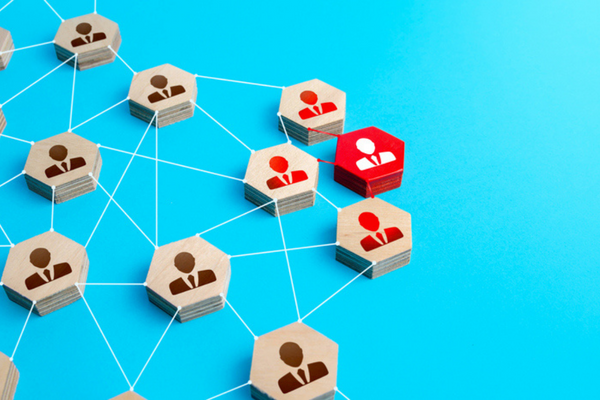
What comes to mind when you think of “networking for introverts”? A room full of people and someone awkwardly standing in the corner? Before I offer some advice for networking if you identify as an introvert, I want to explore what it means to network and what it means to be an introvert.
Exploring What It Means to Network and Be an Introvert
Many people think that introverts are people who are socially awkward. While that is sometimes true, you may be surprised to find that some people who appear very outgoing are actually introverts. Many introverts do exceptionally well at “working a room”—it just takes a little forethought and practice. The biggest difference between an extrovert and an introvert is that after a local section networking event in the evening for an hour or two, an extrovert is going to be ready for more, while the introvert is looking forward to some quiet time on their drive home.
Where do you get your energy—from quiet time or from being with people?
Networking sessions often are designed to help people make many connections in a short amount of time. For that reason, they usually occur in large rooms full of people. However, without significant effort, these networking events rarely lead to a robust “network.”
Networks are like plants that require frequent watering and pruning. A chance meeting at a large event a few years ago doesn’t really mean you have any connection with that person. You need to periodically follow up with them to see how they are doing, see how you might be able to help them in their personal or professional life, and evaluate if they might be able to help you in your personal or professional life.
For introverts or extroverts, it is not about how many people’s contact info is saved in your phone or how many people you connect with on LinkedIn—it is the quality of those connections and your ability to contact that person with confidence that makes a strong network. A strong network should be your main goal; this article will discuss ways to play to your strengths to build one.
Play to Your Strengths
People are most successful when they leverage their strengths. While everyone is different, many introverts prefer to have a conversation with one person or a couple of people rather than a group of people simultaneously. If you find yourself in this category, consider setting up lunch meetings to meet new people or maintain connections within your network. You can also consider meeting someone for ice cream, going for a walk, or getting a drink with one or two people after work.
If you have a strong network, you can ask someone to join you for a meal or other activity and bring someone new for you to meet. This keeps the group small and adds the comfort factor of already knowing at least one of the people you are meeting.
You can use platforms like LinkedIn to meet people “cold” in the same way as you might from a larger networking event. However, you may be able to meet one on one to make the discussion more comfortable. Platforms like LinkedIn can offer some additional benefits because you can learn something about the person before a discussion. You may want to use their profile to think of some questions before you talk with them in case the conversation doesn’t flow naturally.
Making the Most of Large In Person Networking Events
At some point all of us are likely to attend a large networking event. If you are an introvert, these may not be a lot of fun for you. However, there is no reason you can’t greatly benefit from these kinds of events. You may need to prepare more than your extroverted friends to “work the room” like they can.
Before the event, spend some time in personal reflection. What are you trying to achieve by attending the larger networking event? What kinds of people are you hoping to meet? Are you looking to build or maintain your network? How diverse (not just gender and race, but consider age, nationality, geographic location, life experiences, education, etc.) is your current network?
Set some goals for yourself. Consider making a plan to meet a certain number of new people and reconnect with another set of people you already know well. Maybe you want to initiate conversation with at least one new person you haven’t met before. If these kinds of events are particularly uncomfortable, maybe you want to plan to stay for a certain period of time before leaving.
According to many personality surveys, one of the ways to distinguish an introvert from an extrovert is to see where in the room they prefer. Introverts are supposed to like to be along the sides of the room, while extroverts are supposed to enjoy being in the middle of the room. Why not challenge yourself to spend a certain amount of time in the middle of the room? You may broaden your network with some amazing extroverts.
Based on your personal reflection and goals for the event, develop a list of questions to keep “in your back pocket” if there is a lull in conversation, or you are not sure how to start the conversation with someone new. These can be as simple as “tell me about yourself” or more complex to ensure you are making the connections you need. Don’t be afraid to ask someone you just met if they can help you meet someone else.
Do something to increase your energy supply before the event. This often starts with making sure you have a good night’s rest the night before the event. Try to leave yourself enough time to get to the event without any additional stress from navigating unknown roads or conference center hallways or finding parking. If you need a little energy boost, try doing something like listening to music, practicing some breathing exercises, or getting a soda or cup of coffee shortly before the event.
Be patient with yourself and practice often. Even if you don’t meet your goals, you are probably one step closer to building and maintaining a network than you were before the event. Networking in large groups can take practice for everyone.
Be sure you leave some time for yourself at the end of the event. Maybe this is the car ride home or some quiet time after you get home to help you recharge. Nothing says you can’t muster up the energy to fake being an extrovert for the duration of the event, but you may feel exhausted afterwards if you go that route. Knowing you can take the time to recharge can help you to feel more confident going outside your comfort zone.
With practice, a short hour or two event can become very feasible for an introvert to master. This is especially true if you can schedule the time you need afterwards to recharge. Where it becomes much more difficult for introverts, is at multi-day conferences. There may not be breaks that allow you to recharge before the next event or networking opportunity. If this is the case, think about why you are networking and what you hope to get from it. That can help you selectively choose when you might need to take a break by skipping a particular event.
Strong networks can be built on shared experiences. Consider what experiences you think are most helpful to you as you network. These can include an after dinner drink with fellow conference attendees or an early morning run. Some conferences offer service projects. If you know you are often too exhausted to go out with other conference attendees at night and that is where you think valuable networking is occurring, consider taking some time to recharge before or during dinner, even if that means skipping a cocktail hour networking event. At a multi-day conference, you can also try a combination of strategies to build in the time you need for yourself. You may want to plan for a lower energy day or two when you get back from the conference, too.
General Tips on Networking
There is a lot of general advice available on networking in books and the internet. My favorite tips are to develop and maintain a network long before you need it, and to always think of how you can help people in your network as opposed to what that person can do for you.
Since you are building your network before you need it, try to make your network as diverse as possible; you never know what kinds of information or help you may need in the future! While many people think of networking in terms of finding their next job, networking can be excellent for finding a hip new restaurant, an adventurous bike path, or a great parking spot for Fourth of July fireworks. Building and maintaining a robust network will help you in all parts of your life—personal and professional.
This article has been edited for length and clarity. The opinions expressed in this article are the author's own and do not necessarily reflect the view of their employer or the American Chemical Society.
ACS Career Consultants are experts and leaders working in the field of chemistry who have volunteered to support other ACS members’ career development through one-on-one career counselling. They can stimulate your thinking, ask important career planning questions to help clarify goals, provide encouragement, teach strategies for making meaningful career decisions, and aid you in your job search. Connect with an ACS Career Consultant today!
Copyright 2022 American Chemical Society (All Rights Reserved)











